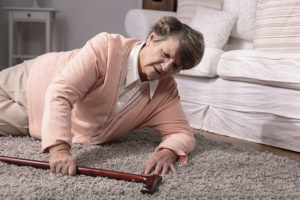 Most seniors would prefer to live at home for as long as possible–and you like the idea of having your senior loved one in their home for as long as possible. Unfortunately, living at home can add several increased risks to what your loved one faces every day. If your loved one is still living at home, make sure that both of you fully understand the risks so if the time comes where additional in-home assistance is needed to ensure your loved one’s safety, you are well-prepared for the change.
Most seniors would prefer to live at home for as long as possible–and you like the idea of having your senior loved one in their home for as long as possible. Unfortunately, living at home can add several increased risks to what your loved one faces every day. If your loved one is still living at home, make sure that both of you fully understand the risks so if the time comes where additional in-home assistance is needed to ensure your loved one’s safety, you are well-prepared for the change.
Risk #1: Isolation
Many seniors find themselves living home alone after their spouse has passed away. This can leave them isolated from the outside world, especially if they don’t regularly go out with friends or if they’re no longer able to drive. Unfortunately, social isolation doesn’t just impact your mental health. It can also cause a decreased lifespan, a higher risk of heart ailments and an increased risk of physical issues as your loved one ages.
Risk #2: Increased Risk of Injuries
As seniors age, their risks of falling and other traumatic injuries rise along with them. Poor eyesight, limited mobility and safety hazards throughout the house can make it difficult to safely perform the daily tasks of living. Seniors who live alone are at increased risk of injury, since there’s no one to help take care of those important tasks for them. It’s also important to consider how injuries might be handled if there’s no one in the home to notice and your loved one is unable to call for help.
Risk #3: Medications
Many seniors discover that their memory is one of the first things to fail them. Sometimes, it’s as simple as walking into a room and forgetting why they’re there. Managing medications properly with poor memory can be an ongoing struggle and frankly, can be very dangerous. Seniors may forget whether or not they’ve taken their medications, leading to over- or under-dosing. This can lead to serious health complications, especially in seniors with significant medical conditions that require regular medication, monitoring and care.
Risk #4: Becoming a Target
Many scammers have learned that seniors living at home alone are an easier target for their scams. Seniors are more likely to give out financial information over the phone or to respond to a plea for help. Scammers may pretend to be a grandchild or other loved one in trouble in an effort to get seniors to give out personal information, which can then leave them suffering financially.
Risk #5: Failing Health Due to Malnutrition
Seniors who live at home alone run an increased risk for malnutrition. They may have poor diets, from struggling to remember whether or not they’ve eaten to choosing unhealthy sweets and other meals instead of healthier options. As appetite decreases or problems with chewing increase, seniors may opt to forego meals, which can in turn lead to malnutrition and other serious health problems.
Risk #6: Higher Rates of Depression and Anxiety
Seniors who live at home alone are at a higher risk to develop depression and anxiety. With too much time to think and not enough interaction with other people, it’s easy to become paranoid or to otherwise struggle with mental health. Depression and anxiety can in turn lead to very physical health problems.
Do you have a senior loved one struggling to perform the tasks of daily living safely? Securing home care services can be a huge help and offer you priceless peace of mind. At Elderlink Home Care, we provide surprisingly affordable care for seniors who need assistance with the activities and tasks of daily living. If you or a loved in is in need of assistance, contact us today to learn more about the services we can provide.
